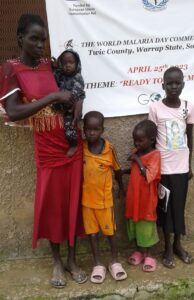 Stories
Stories
August 30, 2023 • 3 min read
Access to healthcare in South Sudan has been significantly and continuously disrupted over many years of conflict and civil unrest. For example, several medical facilities in Twic County in Warrap State in South Sudan have been forced to close, leaving communities without access to basic medical services.
Health Systems Under Pressure
As climate change and conflict continue to displace thousands of people every day, the need to deliver healthcare that promotes resilience in these highly vulnerable communities has never been higher. Today, with funding from the EU, GOAL is supporting over 60 health facilities in South Sudan, with a focus on community health promotion, nutrition, immunisation, disease control, and maternal and child health.
Last November, GOAL expanded its health system strengthening project in Kajo-Keji County, Central Equatoria, South Sudan, to include neighbouring Twic County after the region received thousands of IDPs (Internally Displaced People).
Mass displacement in South Sudan is becoming increasingly more common as the ever-intensifying effects of climate change lead to intense resource competition among pastoral communities. The scarcity of resources often culminates in inter-communal conflict that forces families to flee their homes.
When displaced populations arrive in their host communities, often presenting with many and complex medical needs, local health facilities can become overwhelmed. But thanks to funding from the EU, GOAL has supported the operationalisation of ten primary healthcare facilities in Twic County to facilitate the provision of healthcare services to host and IDP communities. One of the healthcare facilities supported under this project is in Pandit PHCU in Yirol West County.
Stopping the Spread of Disease
Mary Akuach is a mother of four who lives in Pandit Village. Shortages of staff and medicines meant that the Pandit PHCU healthcare facility was unable to consistently deliver quality health services to the local community, so many residents of Pandit Village stopped attending the facility when they were unwell.
“When GOAL arrived [in Pandit], we started receiving regular health services at the facility, and our children and people are no longer suffering from malaria or other contagious diseases,” Mary said.
To raise awareness and increase the uptake of maternal and child health services in Pandit, GOAL staff conducted health education sessions within the community and carried out EPI (Expanded Programme on Immunisation) outreaches to ensure that every child in Pandit was vaccinated.
“I am very happy that GOAL has made sure that our children get vaccinated at the facility and that they sometimes come to the village and go door-to-door with the vaccines,” Mary said.
“The GOAL staff who vaccinated my child advised me on when I should bring my child to the facility for further vaccination,” Mary explained. “Now, my child is healthy. GOAL has freed us from the diseases that usually attack our children, especially polio, measles, tetanus, meningitis, and diphtheria.”

Mary and her children at Pandit PHCU
Improving Maternal Healthcare
GOAL staff in Pandit Village are also referring pregnant and lactating women (PLW) to the facility for antenatal appointments and follow-up visits. Previously, no births were carried out at the facility due to the lack of skilled birth attendants, but with GOAL’s support, women in Pandit Village are now delivering their babies at the facility, where qualified personnel are on hand in the case of emergencies, and where women can be easily referred to larger facilities if complications arise.
Strengthening Health Systems in South Sudan
GOAL has been implementing a health system strengthening project in Kajo-Keji County, South Sudan, since 2021, with the aim of improving access to high-quality curative and preventative nutrition services. These services are vital, given that nearly two-thirds of the South Sudanese population (over seven million people) are malnourished, including 1.4 million children.
The project also aims to support local communities and health system stakeholders in improving their disaster preparedness and response capabilities to ensure the continued provision of healthcare services, even during times of crisis. The project targets vulnerable demographics who are most at risk of health and nutrition-related morbidities and mortalities, including children under the age of five, women of reproductive age, PLW, the elderly, and people with disabilities.
You can support GOAL’s work in South Sudan with a donation today.

